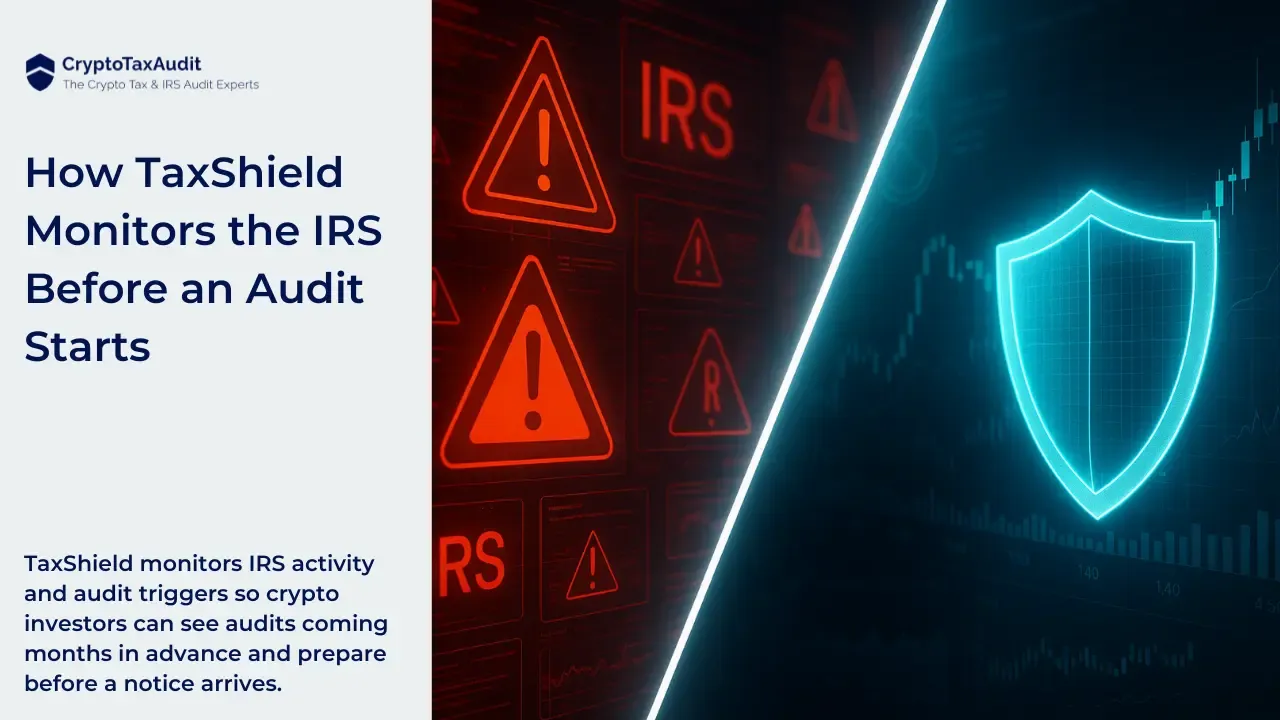
IRS CP21B Notice Explained: What It Means & What You Must Do Next
Key Takeaways
-
The IRS CP21B Notice means a change was made to your return that resulted in a refund—but that doesn’t mean it’s correct.
-
Mistaken IRS adjustments can carry forward and cause future tax issues, including higher bills or repayment demands.
-
Always verify the IRS changes against your original return. It’s your responsibility to catch errors.
-
CryptoTaxAudit doesn’t just file your return—we defend it. If something looks off, we’ll help you make it right.
If you’ve received an IRS CP21B Notice, you might be thinking, “Great, I’m getting a refund!”
But before you celebrate, let’s break down what this notice actually means—and why you need to double-check the details before assuming all is well.
What Is a CP21B Notice?
The CP21B notice is sent when the IRS makes changes to your tax return, resulting in a refund. This could happen for a few reasons:
✅ You requested a correction on a previous tax filing.
✅ The IRS identified an error and adjusted your return accordingly.
✅ A tax law update or administrative review led to an automatic adjustment.
Sounds good, right? Not so fast.
While the IRS might be sending you money, they don’t always get it right—and that’s where problems can start.
Why You Should Double-Check Your CP21B Notice
The IRS isn’t always right—and if there’s an error, it’s your responsibility to catch it before it causes bigger problems later. Here’s what can go wrong:
1️⃣ Incorrect Adjustments Can Cause Future Filing Issues
- If the IRS mistakenly changes your return, those errors can carry over to future filings, leading to inconsistent records.
2️⃣ You Might Owe More Next Year
- If the IRS reduces deductions or credits that you originally claimed, it could mean a higher tax bill next filing season.
3️⃣ Refund Errors Can Lead to Headaches
- If the IRS overpaid you, they’ll demand the money back later—potentially with penalties and interest.
- If they underpaid you, it’s on you to prove it and fight for the difference.
Ignoring a CP21B is like ignoring a liquidation warning on a leverage trade—it’s a bad idea that could cost you later.
What Should You Do If You Get a CP21B Notice?
🔎 Step 1: Review the Notice Carefully
- Look at what the IRS changed and compare it to your original tax return.
- If everything matches up and makes sense, no action is needed.
⚠️ Step 2: If Something Looks Off, Take Action
- Contact the IRS immediately if you believe they made an error.
- Gather supporting documents and records to dispute any incorrect adjustments.
📑 Step 3: Consult a Tax Professional
- If you’re unsure about the changes or don’t want to risk IRS trouble down the road, get expert help.
Crypto Tax Filing Isn’t Enough – Be Ready for the IRS
At CryptoTaxAudit, we do more than just file your taxes—we defend you when the IRS comes calling.
Most tax services stop at calculations, leaving you exposed if you’re audited.
We stand by you every step of the way, ensuring your records are IRS-proof.
Whether you’re dealing with expatriation, business holdings, DeFi trades, or large Bitcoin transactions, our team ensures you’re compliant, audit-ready, and protected.
Don’t wait for an IRS notice.
The best time to secure your portfolio is before the IRS starts asking questions.
Related Articles: FIFO, LIFO, HIFO Explained – Optimizing Your Crypto Taxes
Frequently Asked Questions:
Q: What is a CP21B Notice from the IRS?
A: It’s a notice informing you that the IRS has made changes to your tax return, resulting in a refund—often due to corrections, IRS review, or law updates.
Q: Should I assume everything is correct if I receive a refund?
A: No. Always review the notice carefully. IRS adjustments are not always accurate and could cause future filing or refund issues.
Q: What if the IRS made a mistake on my CP21B notice?
A: Contact the IRS immediately. You’ll need documentation to dispute any errors, and you may want a tax professional to help you respond correctly.
Q: How can CryptoTaxAudit help with CP21B issues?
A: We go beyond tax filing. We review IRS notices, defend your return if needed, and ensure your records hold up in an audit—especially if you trade crypto or hold complex assets.





